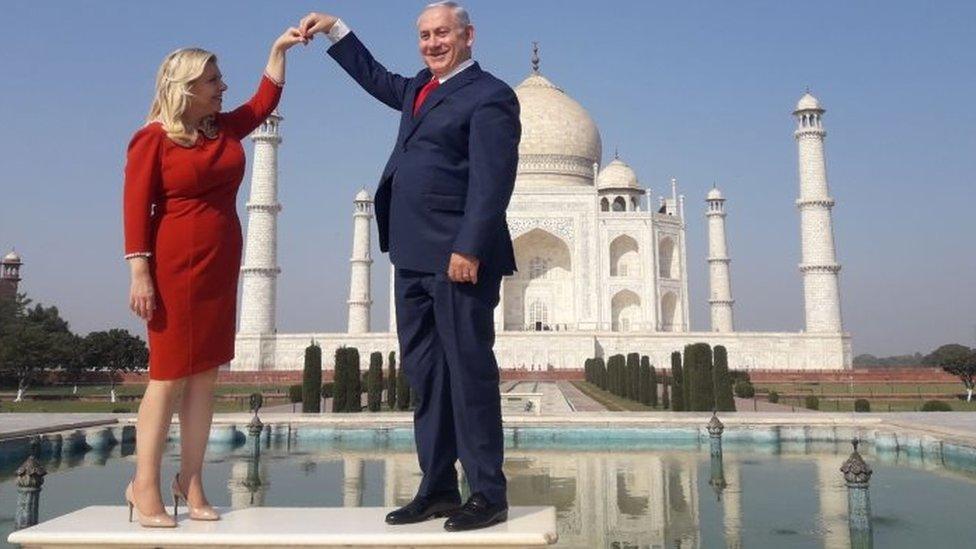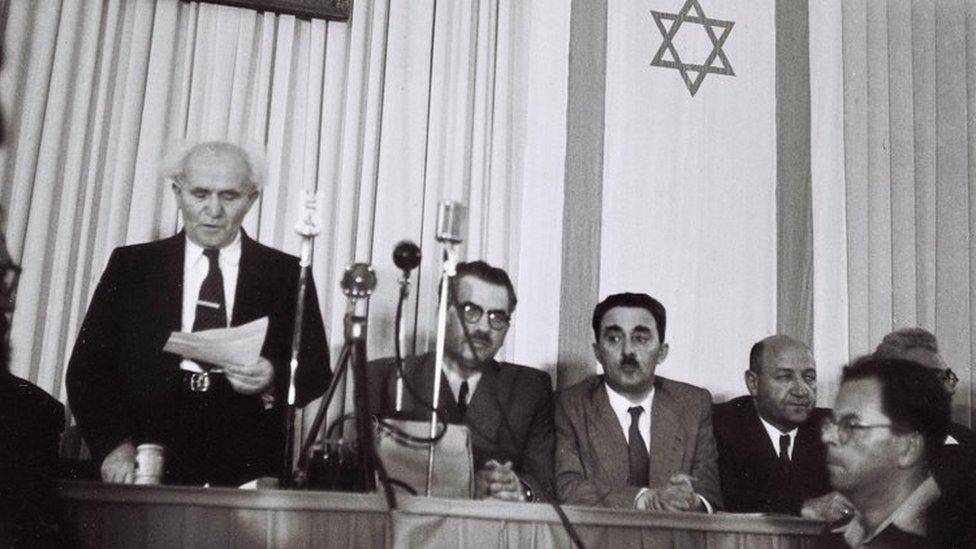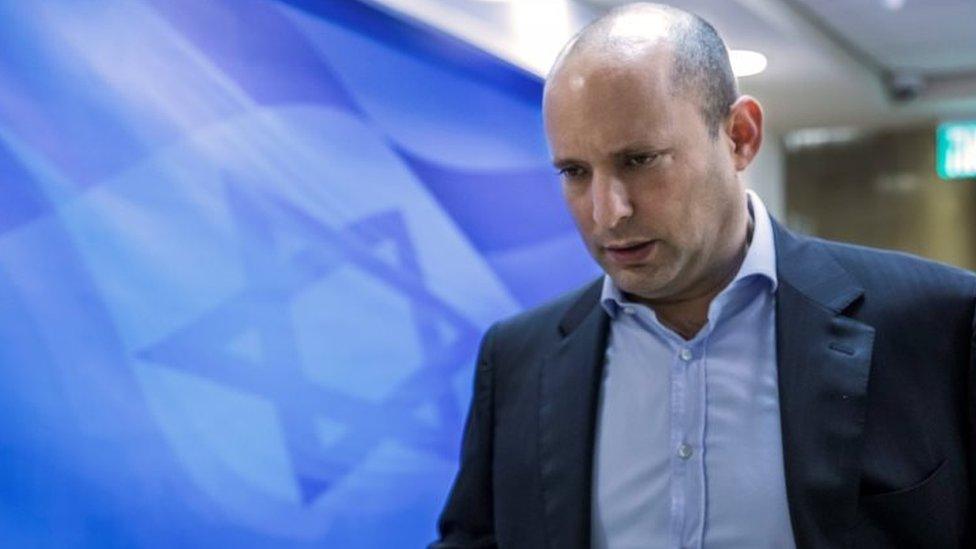Benjamin Netanyahu: Israel's dilemma over PM's future
- Published

Benjamin Netanyahu has pledged that he will remain at his post
During his first tenure as Israel's prime minister, Benjamin Netanyahu was dubbed "the magician" by the local media because of his uncanny ability to extricate himself from the most difficult of situations - starting with his unexpected victory over Shimon Peres in the 1996 election.
Mr Netanyahu's luck - or expertise - may have run its course. It appears that police investigations into rumours and innuendo about corruption which have been swirling around the Netanyahu family for years are now turning into more solid cases.
There are now four police investigations - two against Mr Netanyahu and his family, two against his inner circle.
Case 1000 accuses Mr Netanyahu and his family of accepting gifts from an array of figures such as the Hollywood entrepreneur, Arnon Milchan, and the Australian businessman, James Packer, which were not "of small value and reasonable in context", according to Israeli law.
Mr Netanyahu's wife, Sara, is suspected of accepting 400,000 shekels (£81,000; $113,100) and of instituting cordon bleu meals on a regular basis for the family at the PM's residence - a privilege usually reserved for state visitors.

A life of luxury? Sara and Benjamin Netanyahu
The Israeli press lays most of the blame for this state of affairs at the door of Sara, who - it appears - has been instrumental in pushing for this lifestyle and possesses a reputation for treating employees badly.
Case 2000 involves an alleged deal with the daily Yediot Aharanot to secure better coverage for Mr Netanyahu's policies in exchange for weakening its rival, the hitherto loyal, freebie, Israel Hayom, owned by US businessman Sheldon Adelson.
A taped telephone conversation with Arnon Mozes, Yediot's publisher, and the testimony of Mr Netanyahu's former chief of staff Ari Harow - now a state witness - appear to have turned the tide.
Case 3000 involves Mr Netanyahu's lawyer and cousin, David Shimron, who is being investigated in a case regarding the acquisition of submarines from the German shipbuilder, Thyssen Krupp.
Several suspects have been detained including the former commander of the Israeli Navy. Allegations that unofficial lobbying, indirect bribes and senior officials turned state witness are all features of this case.
Case 4000 involves Shlomo Filber, a former head of the Central Committee of Mr Netanyahu's Likud party, who was appointed director-general of the ministry of communications shortly after the 2015 election.
Mr Netanyahu swiftly dismissed the former holder of the post when he proposed a broadband reform. Mr Filber is suspected of supplying insider information to Bezeq, the major telecom company in Israel. He denies this.
Contradicting Zionist values
All this has left a pungent odour rising from the depths - such behaviour is regarded as far removed from the ethos of Israel's founding generation, whether left or right.

David Ben-Gurion (left) reads the Israeli Declaration of Independence on 14 May 1948
Israel's socialist founding father David Ben-Gurion lived in a simple apartment in Kibbutz Sde Boqer in the Negev desert - he paid more attention to his library than to his living conditions.
Another revered Likud prime minister, Menachem Begin, and his wife lived in basic housing near Tel Aviv's seafront.
Significantly, there have also been public demonstrations against corruption by members of Mr Netanyahu's party.
The protesters have invoked the name of Vladimir Jabotinsky, the ideological founder of the Israeli Right - again a figure who famously never looked for riches and condemned corruption.
The changeover from a stagnant command economy, run by socialists, to a globalised, deregulated one in the 1980s produced a plethora of self-made millionaires in Israel.
It also created an incentive for politicians to make their own fortune and to mix with well-heeled businessmen who could help them in their political endeavours.
Mr Netanyahu's predecessors, Ehud Barak and Ariel Sharon, were the subjects of investigation, while Ehud Olmert was convicted and sent to prison.
In one sense, such an atmosphere contradicted the very values of Zionism - not only to create a new state, but to forge a new society unlike the corrupt ones they had left behind.
PM in defiant mood
Mr Netanyahu has ridiculed the accusations levelled at him and hit back Trump-like against the head of the police anti-corruption unit and other officials.
The journalistic investigations in these cases are deemed to be the work of "a leftist media".
During a 10-minute live TV response to the police indictment on Tuesday evening, Mr Netanyahu protested his innocence and reminded his audience of his devotion to the state of Israel.
The attorney general's office could take months to decide if Netanyahu should face charges
Describing the charges as a culmination of a campaign of slander against him personally and a vilification of his family, Mr Netanyahu pledged that he would remain at his post and that his coalition of the centre-right and the far-right would continue to govern.
Opposition figures immediately called for his resignation.
Mr Netanyahu's far-right allies in the government do not wish to see him in the courtroom since it would almost certainly mean a breakup of the coalition that has governed Israel for most of the last decade.
Education Minister Naftali Bennett, a political rival of Mr Netanyahu, questioned whether a prime minister should be "overthrown for the sake of a few cigars", while Justice Minister Ayelet Shaked pointed out that Mr Netanyahu did not have to resign if he was indicted.

Education Minister Naftali Bennett is seen as a political rival of Mr Netanyahu
There is also a dilemma for the public.
Despite the deep suspicion that Mr Netanyahu does not possess a moral compass, he is seen as the guarantor of security in a time of trauma in the Arab world.
He is the national goalkeeper who keeps the nation safe.
If Israel's arch-enemy Iran presses on with its build-up of hostile forces in Syria and continues to supply arms to its allies in Lebanon, the public may close its eyes to Mr Netanyahu's flaws and demand that security concerns take precedence.
- Published2 January 2017

- Published21 November 2024

- Published13 October 2023
